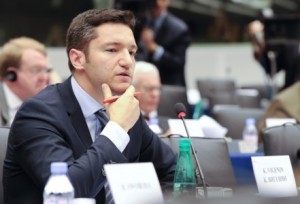 Speech of Mr Kristian Vigenin
Speech of Mr Kristian Vigenin
Co-President of the Euronest Parliamentary Assembly
PABSEC meeting, 27-28 November in Baku
Dear Mr President,
Dear Members of the Parliamentary Assembly of the Black Sea Economic Cooperation,
It is a great honour for me to speak at this 40th PABSEC General Assembly on behalf of the President of the European Parliament, Martin Schulz. The President expresses to you his gratitude for the invitation and his regret for the inability to be present here today.
First of all, I would like to stress that as Bulgarian citizen, the Black Sea region is also my region. The Black Sea region is a part of Europe with a great and long history behind, that should lead all of us -Black Sea countries, regions and cities along with the European Union- towards a close interaction and a deep cooperation. In other words, we should never forget that the Black Sea is a European sea that should serve us as a bridge between our peoples.
The Black Sea region is of strategic importance for the European Union. It is a region which does not only comprise several EU Member States (Bulgaria, Romania, and Greece) but also candidate countries, Turkey and Serbia, a strategic partner, Russia, and the members of the Eastern Partnership – Armenia, Azerbaijan, Georgia, Moldova and Ukraine. It is therefore a region where the European Union wishes to make a concrete contribution to the promotion of peace, democracy, security and prosperity.
This common strategic goal is reflected in the Black Sea Synergy Initiative, launched by the European Union in 2007. It is an inclusive initiative, based on cooperation between all Black Sea countries, with the EU offering its experience and support. The EU Black Sea Synergy aims at bringing concrete benefits to the peoples in the region, including through sector partnerships in the fields of environment, transport and energy. This “synergy” should soon become a fully-fledged “strategy”, as recommended in the resolution of the European Parliament of last year, requesting to develop detailed objectives and benchmarks.
Naturally, cooperation with the Organisation of the Black Sea Economic Cooperation (BSEC) is absolutely essential for the EU Black Sea Synergy. The European Commission was granted the permanent observer status in BSEC since this organisation commemorated its 15th anniversary in Istanbul in June 2007. This year 2012, while we are celebrating the 20th anniversary of BSEC, I am more convinced than ever that the parliamentary dimension of BSEC is fundamental. That is why I am so pleased to be present here in PABSEC today.
As Member of the European Parliament, I know that BSEC and the EU policies in the Black Sea region cover spheres of significant importance for both organisations, both in terms of geographical and policy areas. The European Parliament and PABSEC should therefore continue to develop their cooperation.
I am also speaking here today in my capacity as Co-President of the EURONEST Parliamentary Assembly, which represents the parliamentary dimension of the Eastern Partnership – a framework for fostering political association and economic integration between the EU and six Eastern European and South Caucasian countries.
The EURONEST Parliamentary Assembly was therefore established to promote this process of political and economic cooperation at parliamentary level. It consists of Members of the European Parliament and of Members from the Parliaments of Armenia, Azerbaijan, Georgia, Moldova and Ukraine. By looking at the countries represented and at our respective mandates, it is quite clear that the European Parliament, PABSEC and Euronest have a lot of interests in common and that our actions reinforce each other.
Allow me to illustrate this by giving a few examples of the concrete projects and initiatives of the European Union in the Black Sea region.
One of the existing EU projects is the Joint Operational Programme for Cross-Border Cooperation in the Black Sea Basin, financed under the European Neighbourhood and Partnership Instrument. It focuses on such priorities as the economic and social development; environmental protection and conservation; as well as cultural networking and educational exchange. This programme can be clearly regarded as a successful EU initiative with a great number of cross-border cooperation projects being implemented. During this process the EU joins its forces with the authorities in the BSEC member states.
Cooperation with countries of the Black Sea region in the area of energy security is of great geo-political significance for the EU in terms of the diversification of energy supply sources. This importance is emphasised in the Black Sea Synergy Communication and in the Energy Roadmap 2050, and it is reflected in a number of combined initiatives, including the Energy Community, INOGATE and, of course, the Eastern Partnership. As parliamentary bodies, the European Parliament, PABSEC and the Euronest Parliamentary Assembly play an important role in generating public debate on these issues.
The Energy Community plays a great role in the framework of regional cooperation in the energy area. Its role is particularly obvious now when such countries as Moldova and Ukraine have become parties to the Energy Community Treaty, and Armenia and Georgia have the observer status. Joining the Energy Community requires a strong commitment from our partners.
Another programme covering the countries of the Black Sea region and linked to the Energy Community is the INOGATE Programme on the energy cooperation between the EU, Eastern Europe, the Caucasus and Central Asia.
Allow me to underline once again the importance of the dialogue on energy security between the EU and its partners in the Black Sea region. In this respect I would like to stress the necessity of opening the Southern Gas Corridor and investing in advanced technologies for the transport and use of liquefied natural gas (LNG) together with development of LNG terminals in Black Sea ports.
However, I also would like to point out the environmental concerns of the EU with regards to the energy production and energy consumption. The EU together with the partners from the Black Sea region should strive for the development of renewable resources and energy-saving technologies, aiming at the gradual abatement of the CO2 emissions.
I would like to call on the member states of the BSEC to actively engage in such initiatives as ‘Covenant of Mayors’ and ‘Smart Cities and Communities European Innovation Partnership’. The Covenant of Mayors is the European movement involving local and regional authorities. Its main concern is the fight against climate change. The Smart Cities and Communities European Innovation Partnership is a new initiative launched by the European Commission in July 2012. Under the project the energy, transport and ICT industries are supposed to work together with cities and use innovative, integrated and efficient technologies to address the needs of local communities.
Economic integration is another key issue on which both BSEC and the EU work in the region. Substantial progress in this sphere is achieved through the Deep and Comprehensive Free Trade Agreements (DCFTAs) under negotiation between the EU and Ukraine, Moldova, Georgia and Armenia. The European Parliament is closely following this process, since it will eventually be asked to give its consent to DCFTAs after negotiations are concluded.
At the multilateral level, the Eastern Partnership has one of its four platforms dedicated to economic integration, legal approximation and convergence with the EU policies. Its primary aim is to deepen economic cooperation between the EU Member States and the Eastern neighbours. The Euronest Parliamentary Assembly has therefore also established a Committee on this issue, to engage parliamentarians in this important debate.
One of the BSEC areas of activities is SME policy and both the Eastern Partnership and the EURONEST Parliamentary Assembly also recognise the vital role of SMEs in the economy of the EU and its partners.
Another important sphere of cooperation covered by both our organisations is customs cooperation.
Last but not least, both PABSEC and EURONEST cover such areas as democracy promotion and international security. The European Parliament welcomes and supports the promotion of democratic values, the rule of law, human rights, fundamental freedoms and good governance principles in all the BSEC member states.
I would like to call on the BSEC member states to work together towards the resolution of the tensions and security challenges in the region for the benefit of the population of all the concerned countries.
Finally, there is one more thing in common for PABSEC and Euronest PA. Few months ago we had our Second Ordinary Session, the first one outside the EU, in this wonderful city of Baku. Knowing the hospitality of the Parliament of Azerbaijan and the hospitality of the people of Azerbaijan, I have no doubt that your meeting today and tomorrow will be very successful.
On behalf of the President of the European Parliament and on my own behalf I would like to express once again our gratitude for the invitation to address you today and our readiness to further cooperate with the Parliamentary Assembly of the Black Sea Economic Cooperation.
Thank you!
